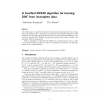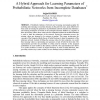396 search results - page 9 / 80 » The missing Wendland functions |
CORR
2010
Springer
13 years 8 months ago
2010
Springer
Aim of this paper is to address the problem of learning Boolean functions from training data with missing values. We present an extension of the BRAIN algorithm, called U-BRAIN (U...
ICASSP
2008
IEEE
14 years 3 months ago
2008
IEEE
In this paper, we describe a novel statistical approach to the vocal tract transfer function (VTTF) estimation of a speech signal based on a factor analyzed trajectory hidden Mark...
HIS
2003
13 years 10 months ago
2003
– Probabilistic Inference Networks are becoming increasingly popular for modeling and reasoning in uncertain domains. In the past few years, many efforts have been made in learni...
JPDC
2006
13 years 8 months ago
2006
We introduce Virtual Leashing,1 a new technique for software protection and control. The leashing process removes small fragments of code, pervasive throughout the application, an...
CSDA
2007
13 years 8 months ago
2007
Random k-nearest-neighbour (RKNN) imputation is an established algorithm for filling in missing values in data sets. Assume that data are missing in a random way, so that missing...


